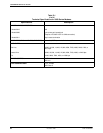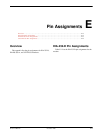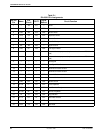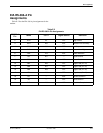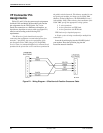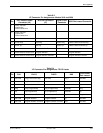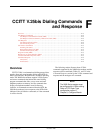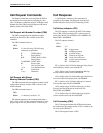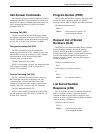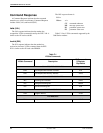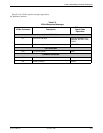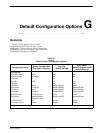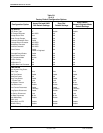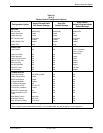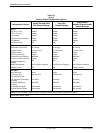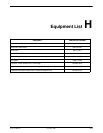
CCITT V.25bis Dialing Commands and Response
F-33810-A2-GB30-20 November 1996
Call Answer Commands
Call
Answer commands disable or enable the modem’
s
AutoAnswer function. These commands are issued from
the DTE. Call Answer commands include Incoming Call
(INC), Disregard Incoming Call (DIC) and Connect
Incoming Call (CIC).
Incoming Call (INC)
The INC response informs the DTE that the modem
has detected a ring tone. At this point, the DTE can issue
the DIC command to disable the modem from answering
the call. INC is similar to the A
T result code RING.
Disregard Incoming Call (DIC)
The DIC command prevents the modem from
answering an incoming call. This command is only valid
once the DTE receives an incoming call (INC) response
from the modem. A DIC must be issued within
5 seconds after receiving an INC.
The DIC command format is DIC.
If DIC is issued within 5 seconds, the modem sends the
VAL response to the DTE. If DIC is issued after 5
seconds, INV is returned.
Connect Incoming Call (CIC)
The
CIC command forces the modem to cancel any
DIC commands and answer an incoming call. This
command is only valid when the DTE issues a DIC
command. CIC must be issued within 10 seconds after
sending a DIC. CIC is similar to the A
TA command.
The CIC command format is CIC.
If CIC is issued within 10 seconds, the modem sends
the V
AL response to the DTE. If CIC is issued after 10
seconds, INV is returned.
Program Normal (PRN)
The Program Normal (PRN) command allows the DTE
to enter and store a telephone number to a specific
directory location. PRN is similar to the AT&Z command.
The PRN command format is:
PRNx;n
Where:
x
is the directory location 1–10.
n is the telephone number.
Request List of Stored
Numbers (RLN)
The Request List of Stored Numbers (RLN) command
displays telephone numbers stored in the modem’
s
directory location. If the RLN command is entered
without specifying a directory location, then all directory
locations and telephone numbers are displayed. If a
directory location is entered, then only that telephone
number are displayed.
The RLN command format is:
RLN
which displays all directory locations,
or
RLNx
Where: x is a directory location.
List Stored Number
Response (LSN)
LSN
is a response to an RLN command issued by the
DTE. If a directory location is specified, then the
telephone number for that location is displayed. If no
directory location is specified, then all telephone numbers
stored in memory are displayed.
The LSN response format is:
LSNx;n
Where: x is the directory location.
n is the telephone number.



